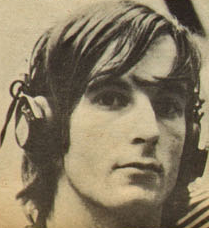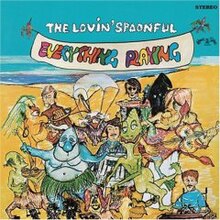
John Benson Sebastian (born March 17, 1944) is an American singer, songwriter and musician who founded the rock band the Lovin' Spoonful. He made an impromptu appearance at the Woodstock festival in 1969 and scored a U.S. No. 1 hit in 1976 with "Welcome Back."

Zalman Yanovsky was a Canadian folk-rock musician. Born in Toronto, he was the son of political cartoonist Avrom Yanovsky and teacher Nechama Yanovsky, who died in 1958. He played lead guitar and sang for the Lovin' Spoonful, a rock band which he founded with John Sebastian in 1964. He was inducted into the Canadian Music Hall of Fame in 1996. He was also inducted into the Rock and Roll Hall of Fame in 2000 as a member of the Lovin’ Spoonful. He was married to actress Jackie Burroughs, with whom he had one daughter, Zoe.

The Lovin' Spoonful is an American folk rock band formed in Greenwich Village, New York City, in 1964. The band was among the most popular groups in the United States for a short period in the mid-1960s and their music and image influenced many of the contemporary rock acts of their era. Beginning in July 1965 with their debut single "Do You Believe in Magic", the band had seven consecutive singles reach the Top Ten of the U.S. charts in the eighteen months that followed, including the number two hits "Daydream" and "Did You Ever Have to Make Up Your Mind?" and the chart-topping "Summer in the City".

What's Up, Tiger Lily? is a 1966 American comedy film directed by Woody Allen in his feature-length directorial debut.

Joseph Campbell Butler is an American drummer and stage actor. He is a member of the Lovin' Spoonful, who had seven top 10 hits between 1965 and 1966.

Daydream is the second album by the Lovin' Spoonful, released in 1966. It features two hits, "Daydream", which reached No. 2 in the U.S. Billboard Top 40 charts, and "You Didn't Have to Be So Nice".

"Summer in the City" is a song by the American folk rock band the Lovin' Spoonful. Written by John Sebastian, Mark Sebastian and Steve Boone, the song was released as a non-album single in July 1966 and was included on the album Hums of the Lovin' Spoonful later that year. The single was the Lovin' Spoonful's fifth to break the top ten in the United States and their only to reach No. 1. A departure from the band's lighter sound, the recording features a harder rock style. The lyrics differ from most songs about the summer by lamenting the heat, contrasting the unpleasant warmth and noise of the daytime with the relief offered by the cool night, which allows for the nightlife to begin.

Farewell Aldebaran is a 1969 album by American musicians Judy Henske and Jerry Yester. Originally released on Frank Zappa's Straight record label, it contains an eclectic mix of songs in a wide variety of styles and is also notable for its early use of synthesisers. AllMusic describes the album as "a fusion of folk music, psychedelia, and arty pop, though that only scrapes the surface of the LP's stylistic complexity." Although the album got some good reviews it failed to sell in large quantities, purchasers possibly confused by its eclecticism.

Jerome Alan Yester is an American folk rock musician, record producer, and arranger.

Hums of the Lovin' Spoonful is the third studio album and fourth overall by American folk rock band the Lovin' Spoonful, released in 1966 by Kama Sutra Records. It peaked at No. 14 on the Billboard Pop Albums chart.

Steve Boone is an American bass guitarist and music producer, best-known as a member of the American folk-rock group The Lovin' Spoonful. Steve co-wrote two of the groups' biggest hits, "You Didn't Have to Be So Nice" and "Summer in the City".

The Lovin' Spoonful Anthology is a compilation album by the folk rock group the Lovin' Spoonful, released in 1990.

The Best of the Lovin' Spoonful is a 1967 compilation album by the Lovin' Spoonful featuring hits and other tracks from their first three albums. It charted the highest of the group's career, hitting number three on the Billboard Top LPs chart.

"Daydream" is a song by the American folk rock band the Lovin' Spoonful. Written by John Sebastian, it was issued as a single in February 1966 and was the title track of the band's second album, Daydream, released the following month. The song was the Lovin' Spoonful's third consecutive single to enter the top ten in the United States, and it was their best performing to that point, reaching number two. The single's European release coincided with a British and Swedish promotional tour, leading the song to be the band's first major hit outside North America. It topped sales charts in Canada and Sweden, and it was ultimately the band's most successful record in the United Kingdom, where it reached number two.

"Darling Be Home Soon" is a song written by John Sebastian of the Lovin' Spoonful for the soundtrack of the 1966 Francis Ford Coppola film You're a Big Boy Now. It appeared on the Lovin' Spoonful's 1967 soundtrack album You're a Big Boy Now. Sebastian performed his composition at Woodstock; it was the fourth song out of the five he performed at the 1969 music festival in White Lake, New York.

Revelation: Revolution '69 is the fifth and final studio album by the Lovin' Spoonful, released in late 1968.

A Spoonful of Jazz is an album by saxophonist Bud Shank recorded in 1967 for the World Pacific label. The album features interpretations of tunes associated with The Lovin' Spoonful.

James Yester is an American musician. He is a member of the sunshine pop group the Association, who had numerous hits on the Billboard charts during the 1960s, including "Windy", "Cherish", "Never My Love" and "Along Comes Mary", among many others.

The Lovin' Spoonful is an American folk rock band which was originally active between 1964 and 1968. During their original tenure, they released five studio albums, two soundtrack albums, four compilation albums, and fourteen singles in the United States. Between October 1965 and January 1967, their first seven singles reached the Top Ten in the United States on Billboard magazine's Hot 100 chart. The band experienced their biggest successes in 1966, a year in which Billboard's end-of-year issue ranked the group as that year's third-best-performing singles artist, after the Beatles and the Rolling Stones. The band achieved success during the transition to the album era, but both they and their label focused on the singles market; their second studio album, Daydream, was their only to break the Top Ten of the Billboard Top LPs chart. Its performance was bested only by a 1967 compilation album, The Best of the Lovin' Spoonful, which RIAA certified for gold that year. The Lovin' Spoonful saw diminished success in 1967, when only two of their singles entered the top twenty in the U.S. Following further chart disappointments, the group disbanded in 1968.

"Rain on the Roof" is a song by the American folk rock band the Lovin' Spoonful. Written by John Sebastian, the song was released as a single in October 1966 and was included on the album Hums of the Lovin' Spoonful the following month. The song reached number ten on the Billboard Hot 100 chart, making it the Lovin' Spoonful's sixth consecutive single to reach the top ten in the United States.




















